Iran Says Prospect Of Nuclear Deal Unclear Due To US Delays
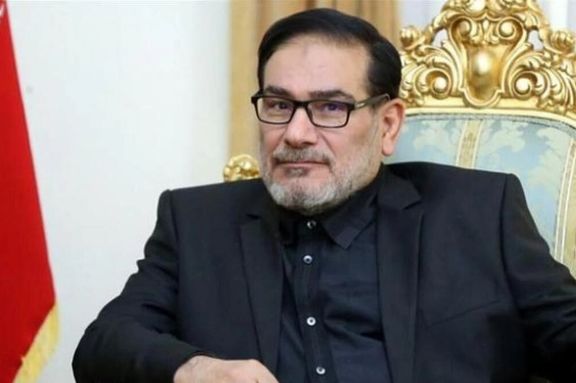
Iran's top security official says the fate of the Vienna nuclear negotiations is tied to delays in the political decisions by the United States.

Iran's top security official says the fate of the Vienna nuclear negotiations is tied to delays in the political decisions by the United States.
The secretary of Iran’s Supreme National Security Council, Ali Shamkhani, on Monday that the “prospect of a deal in Vienna talks remains unclear due to Washington's delay in making political decisions”.
The priority of Iranian negotiators is to resolve the remaining issues that are considered as the red lines for Tehran, he added, calling for “new initiatives from all parties” for a swift conclusion to a “strong deal.”
In another tweet earlier in the day, Shamkhani said, "Vienna participants act and react based on [their own] interests and it's understandable. Our interactions with 4+1 are also solely driven by our people's interests. Thus, we're assessing new elements that bear on the negotiations and will accordingly seek creative ways to expedite a solution”.
Iran’s foreign ministry said Monday that Tehran is awaiting clarification from Moscow over its demand to be exempted from Ukraine sanctions in its dealing with Iran.
"We have seen and heard about [Russian Foreign Minister Sergei] Lavrov's comments in the media. We are awaiting to hear its details through diplomatic channels," the ministry’s spokesman Saeed Khatibzadeh said at his weekly press conference.
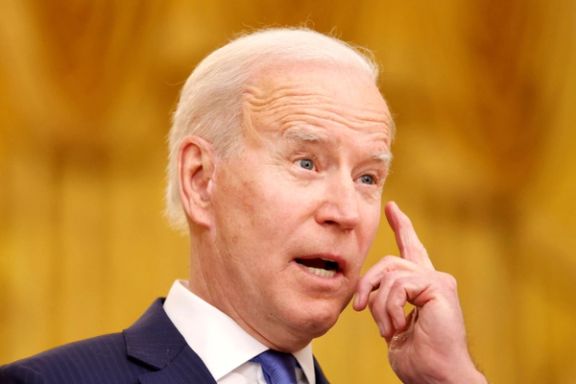
More US Republican senators say the Biden administration is taking advantage of the Russia invasion of Ukraine to seal the nuclear deal with Iran.
Senator Bill Hagerty said on Sunday that President Joe Biden hopes Russia’s invasion “offers a distraction while he enters another nuclear deal that gives Iran and its terrorist proxies tens of billions in sanctions relief”.
He added, “I assure you I am not distracted and will do everything I can to stop this bad deal”.
Slamming Biden over his response to President Vladimir Putin's deadly attack, Hagerty said Biden must "demonstrate resolve" because Putin only responds to "people that show a spine" and stand up to the authoritarian leaders in order to help the country fight back.
Senator Dan Sullivan, another Republican lawmaker, also said on Sunday that “the courageous struggle of Ukrainians has united the West to a degree that hasn’t been seen in a long time” and “Biden is aiming a sledgehammer at that unity by resuscitating the dangerous Iran nuclear deal”.
He added, “The Biden administration is desperate to revive the dangerous Iran nuclear deal, and the mullahs in Tehran know it”, stressing that “This is how bad policy is made”.
On Saturday, Senator Kevin John Cramer said the revival of the 2015 nuclear deal between Iran and world powers only emboldens Iran and endangers the security of the United States and Israel.
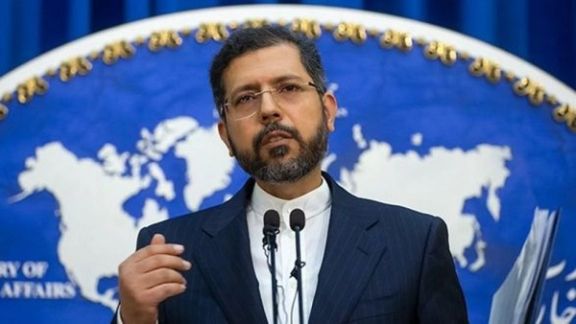
Iran’s foreign ministry said Monday that Tehran is awaiting clarification from Moscow over its demand to be exempted from Ukraine sanctions in its dealing with Iran.
"We have seen and heard about [Russian Foreign Minister Sergei] Lavrov's comments in the media. We are awaiting to hear its details through diplomatic channels," the ministry’s spokesman Saeed Khatibzadeh said at his weekly press conference.
The comment showed that Tehran is in an uncomfortable position with its close ally making demands from the United States amid nuclear talks crucial for Iran, apparently without coordination.
Three days have passed since Russian foreign minister Sergei Lavrov said that international sanctions related to Ukraine had created "problems from the point of view of Russia's interests" regarding the restoration of the 2015 deal, Joint Comprehensive Plan of Action (JCPOA), and that sanctions on Russia could complicate Moscow's involvement in Tehran's civilian nuclear program as well as arms sales to Iran.
Khatibzadeh made the comment when asked by a reporter if Lavrov's demands did not mean taking the Iran nuclear talks hostage to its own interests. Iran’s Tasim news agency in its report mentioned the loaded question, a rare practice for government-run media when an issue relates to an ally.
This was Tehran's first official reaction to Lavrov's controversial remarks which some say amounts to ruining prospects of a deal to restore the JCPOA in the coming days by pulling out of the talks. "We haven't heard about Russia's intention to withdraw from the JCPOA, this is only media speculation," Khatibzadeh said and insisted that Russia should raise any concerns it may have "within the Vienna talks".
He said Russia's concerns over Ukraine sanctions are "understandable" but appeared to be suggesting that in regard to Iran and the restoration of the JCPOA, Russia could demand exemption from US sanctions only in connection with its nuclear cooperation with Iran withing the JCPOA framework.
"Vienna participants act and react based on [their own] interests and it's understandable," Ali Shamkhani, Secretary of Iran's Supreme National Security Council, said in a tweet Monday. "Our interactions with 4+1 are also solely driven by our people's interests. Thus, we're assessing new elements that bear on the negotiations and will accordingly seek creative ways to expedite a solution," he added.
Khatibzadeh also insisted that the process in Vienna continues "along its own path". "It's clear that Iran's peaceful nuclear cooperation with other countries, including Iran's peaceful cooperation with Russia and China, should not be restricted or affected by any sanctions. We understand [Lavrov's] remarks within the same context," Khatibzadeh told reporters.
"The path of Vienna [talks] is very clear… In the past few months, we have made every effort for the dossier to proceed with a meaningful distance from other international dossiers," he said. "We are in difficult negotiations. We have seen different reactions from different actors on different days. We are not alarmed by the positions of countries [involved in the talks], whether some stances announced by [some] countries in the past or what we are hearing these days," he added.
khatibzadeh also said that Russia's approach towards reaching an agreement in Vienna has been constructive "so far" and reiterated that Iran is awaiting to hear further details from the Russian side in Vienna, "if there is any".
The Iranian delegation's media advisor, Mohammad Marandi, told Al Jazeera on Sunday that Iran is "waiting for verification from Russians" about their demands from the US because "it's not quite clear exactly what the Russians mean".
US Secretary of State Antony Blinken on Sunday dismissed Russian demands of guarantees that Ukraine sanctions would not hamper its trade with Iran. They "just are not in any way linked together, so I think that's irrelevant," he said, adding that it is in the interests of both Russia and the US that Iran is not able to "have a nuclear weapon or the capacity to produce a weapon on very, very short order."
Some media in Tehran and many Iranian social media users have interpreted Lavrov's remarks Saturday as "blackmail" and "taking the JCPOA hostage" to secure Russia's own interests.
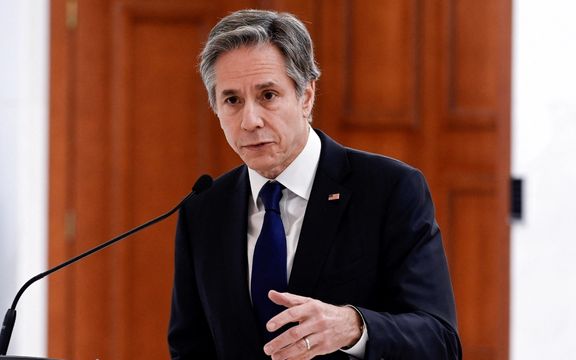
US Secretary of State Antony Blinken has dismissed Russian demands of guarantees that Ukraine sanctions would not hamper its relations with Iran.
Moscow’s demand was two pronged. First, it alluded to its ability to play its role in an imminent nuclear deal with Iran, and second to have economic and military ties with Tehran without being hampered by recent sanctions imposed for its invasion of Ukraine.
A day after Russian Foreign Minister Sergei Lavrov demanded written guarantees from Washington to that effect, Blinken said Sunday that the Ukraine sanctions have nothing to do with a potential nuclear deal with Iran.
They "just are not in any way linked together, so I think that's irrelevant," he said, adding that it is in the interests of both Russia and the US that Iran is not able to "have a nuclear weapon or the capacity to produce a weapon on very, very short order."
Lavrov said Saturday that international sanctions against Russia had created "problems from the point of view of Russia's interests" regarding the restoration of the 2015 Iran nuclear deal, Joint Comprehensive Plan of Action (JCPOA), and that sanctions on Russia could complicate Moscow's involvement in Tehran's civilian nuclear program as well as arms sales to Iran.
A European diplomat who spoke to Iran International in Vienna on condition of anonymity said Saturday that Russia’s demand of US guarantees over Ukraine sanctions not impeding its dealings with Iran go farther than Tehran’s nuclear issue.
Iran's foreign ministry, as well as other officials and government-run media have not shown any reaction to Lavrov's remarks yet but the Iranian delegation's media advisor, Mohammad Marandi, told Al Jazeera Sunday that Iran is "waiting for verification from Russians" about their demands from the US because "it's not quite clear exactly what the Russians mean".
The demand is relevant if it is linked to the actual implementation of the JCPOA, especially with regards to the Iranian nuclear program itself, Marandi said. "Because Russians play a role in resolving issues, they will be dealing with enriched uranium and other elements of the nuclear program."
Abolfazl Amuei, a member of the Iranian parliament's National Security and Foreign Policy Committee, said Sunday that Iran had not asked the Russian side to demand for guarantees from the US. “This is in fact something that Russia and the US must resolve between themselves because it is related with the relations between them in regards to Ukraine."
"Iran has made every effort to distance the Vienna talks from events in Eurasia, Eastern Europe and Ukraine developments. Therefore, Americans must be able to satisfy all parties' wishes on their own," Amuei said.
Some media in Tehran and many Iranian social media users interpreted Lavrov's remarks Saturday as "blackmail" and "taking the JCPOA hostage" to secure Russia's own interests.
Speaking to conservative Entekhab website Sunday, a former Iranian diplomat to the United Nations, Kourosh Ahmadi, said Russia may be aiming at delaying the restoration of the JCPOA and putting pressure on the West.
Restoration of the JCPOA at this time is not in Russia's interest because oil markets' need for Russian oil will decrease if sanctions on Iran are lifted and Iranian oil becomes available in international markets, Ahmadi said. "Oil prices will also drop by 10 to 15 percent. Therefore, it is in Russia's interest to delay the return of Iran's oil to markets as long as possible," he added.

A European diplomat has said Russia’s demand of US guarantees over Ukraine sanctions not impeding its dealings with Iran go farther than Tehran’s nuclear issue.
"[Russian Foreign Minister Sergei] Lavrov's demands are way above nuclear cooperation [allowed by the 2015 nuclear deal with Iran]," the diplomat who spoke to Iran International in Vienna on condition of anonymity said.
Lavrov said Saturday that international sanctions against Russia had created "problems from the point of view of Russia's interests" regarding the restoration of the 2015 deal, Joint Comprehensive Plan of Action (JCPOA), and that sanctions on Russia could complicate Moscow's involvement in Tehran's civilian nuclear program as well as arms sales to Iran.
The diplomat said that Russia's envoy in the Vienna talks, Mikhail Ulyanov, had first raised the issue of Ukraine sanction only in relation to Moscow's role in a possible nuclear deal with Tehran, but Lavrov's remarks went much farther, demading a wider exemptions in dealings with Iran.
Lavrov said that Russia and China would be able to help Iran develop its civilian nuclear program in line with non-proliferation rules and should be free to do so without the threat of recent sanctions imposed for Russia’s attack on Ukraine. But he demanded written guarantees from the US, at the minimum level of Secretary of State, that the Ukraine-related sanctions by the US would not in any way harm Russia's "right to free, fully-fledged trade and economic and investment cooperation and military-technical cooperation with Iran".
"The new Russia-related sanctions are unrelated to the JCPOA and should not have any impact on its potential implementation," a State Department spokesperson said Saturday adding that Washington continues to engage with Russia on a return to full implementation of the JCPOA. "Russia shares a common interest in ensuring Iran never acquires a nuclear weapon. "
Iranian officials have not shown any reaction to Lavrov's remarks but somemedia in Tehran and many Iranian social media users interpreted Lavrov's remarks Saturday as "blackmail" and "taking the JCPOA hostage" to secure Russia's own interests.
The diplomat added that Lavrov's remarks Saturday would pose an important political obstacle to Vienna talks if what Moscow wants is lifting some of the sanctions imposed on it for its invasion of Ukraine.
It is widely assumed Russia would play a central role in implementing a revived JCPOA, including shipping out enriched uranium currently held by Iran exceeding JCPOA limits. On Saturday the Russian envoy to the talks, Mikhail Ulyanov, said he had met with Enrique Mora, the EU Coordinator at the Vienna talks, and raised several questions that have to be addressed at this stage 'to ensure smooth civil nuclear cooperation with Iran".
The European diplomat also told Iran International that besides Lavrov's new demand, the two issues that Iran has been insisting on – economic guarantees from the US to ensure sanctions are lifted and delisting the Revolutionary Guards (IRGC) as a terrorist organization – have remained unresolved so far.
Two diplomats, one of them not directly involved in the talks, told Reuters on Saturday that China has also demanded written guarantees that its companies doing business in Iran would not be affected by US sanctions.
Talks in Vienna between Iran and world powers, including Russia, to restore the JCPOA have now reached a critical stage with most sides saying an agreement could be reached within days.
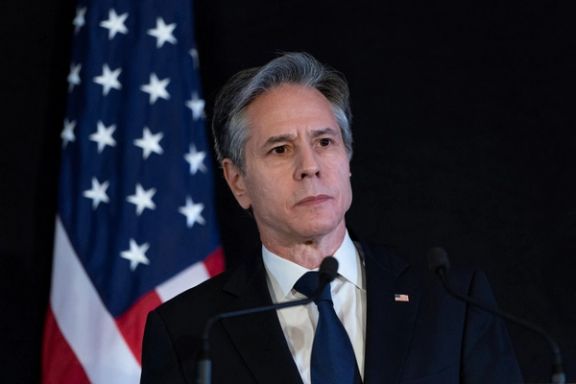
US House Republicans have written a letter to Secretary of State Antony Blinken calling for Washington to abandon the Vienna nuclear talks with Iran.
House Republican Leader Kevin McCarthy and House Foreign Affairs Committee Lead Republican Michael McCaul published the letter to Blinken on Saturday, saying “We are alarmed that the Biden Administration may be preparing to evade the clear requirements of the law by pretending that a new deal is somehow a ‘continuation of’ or ‘return to’ the Joint Comprehensive Plan of Action (JCPOA) that was submitted to Congress back in 2015.”
“That would be an absurd and lawless claim. Any deal the Administration concludes cannot be a return to the original JCPOA. The United States withdrew from the JCPOA in May 2018”, they said.
They expressed urgent concern that “the Administration is working through Russian intermediaries to finalize an Iran nuclear deal without submitting it for Congressional consideration, as required by law”.
The lawmakers said the agreement would hand tens of billions of dollars to “the world’s largest state sponsor of terrorism” and remove sanctionson “terrorists with blood on their hands”, which would require Congressional review.
Republicans have consistently opposed President Joe Biden’s policy of reviving the JCPOA and lifting sanctions imposed by former president Donald Trump.
They said Iran has violated JCPOA limitations in numerous cases, including producing equipment for advanced centrifuges and stockpiling uranium enriched at 20% and 60% purity, noting such violations make it impossible to simply “return” to the 2015 deal.